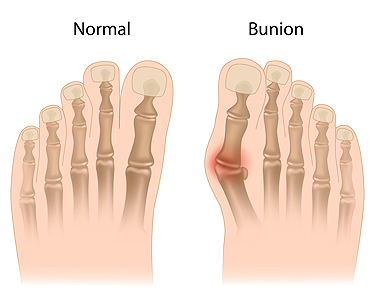
A bunion, or hallux valgus, is a bony protrusion at the base of the big toe, developing from pressure causing the toe to lean towards the second toe. This misalignment, often resulting from the joint at the toe's base bearing significant weight during activities such as standing and walking, can lead to symptoms like pain, stiffness, redness, and swelling. Additionally, calluses often form due to friction between the big and second toe or on the ball of the foot. Bunions tend to worsen over time if not addressed, possibly causing difficulty in wearing shoes and walking comfortably. While bunions are more common in adults, they can also be present from birth or develop during childhood. The condition can affect one or both feet, posing a persistent challenge to foot comfort and function. If you have an uncomfortable bunion, it is suggested that you schedule an appointment with a podiatrist to discuss treatment options that may increase your comfort.
If you are suffering from bunions, contact one of our doctors of Godoy Foot and Ankle Center. Our doctors can provide the care you need to keep you pain-free and on your feet.
What Is a Bunion?
A bunion is formed of swollen tissue or an enlargement of boney growth, usually located at the base joint of the toe that connects to the foot. The swelling occurs due to the bones in the big toe shifting inward, which impacts the other toes of the foot. This causes the area around the base of the big toe to become inflamed and painful.
Why Do Bunions Form?
Genetics – Susceptibility to bunions are often hereditary
Stress on the feet – Poorly fitted and uncomfortable footwear that places stress on feet, such as heels, can worsen existing bunions
How Are Bunions Diagnosed?
Doctors often perform two tests – blood tests and x-rays – when trying to diagnose bunions, especially in the early stages of development. Blood tests help determine if the foot pain is being caused by something else, such as arthritis, while x-rays provide a clear picture of your bone structure to your doctor.
How Are Bunions Treated?
- Refrain from wearing heels or similar shoes that cause discomfort
- Select wider shoes that can provide more comfort and reduce pain
- Anti-inflammatory and pain management drugs
- Orthotics or foot inserts
- Surgery
If you have any questions, please feel free to contact our office located in Wayne, NJ . We offer the newest diagnostic and treatment technologies for all your foot care needs.
